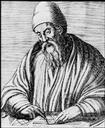

Euclid lived around the time of 300 BC. He was a Greek mathematician. Little is known of his life other than the fact that he taught at Alexandria, being associated with the school that grew up there in the late 4th century BC.
He is famous for his Elements, a presentation in thirteen books of the geometry and other mathematics known in his day. The first six books cover elementary plane geometry and have served since as the basis for most beginning courses on this subject. The other books of the Elements treat the theory of numbers and certain problems in arithmetic (on a geometric basis) and solid geometry, including the five regular polyhedra, or Platonic solids.
The great contribution of Euclid was his use of a deductive system for the presentation of mathematics. Primary terms, such as point and line, are defined; unproved assumptions, or postulates, regarding these terms are stated; and a series of statements are then deduced logically from the definitions and postulates.
Although Euclid's system no longer satisfies modern requirements of logical rigor, its importance in influencing the direction and method of the development of mathematics is undisputed. A few modern historians have questioned Euclid's authorship of the Elements, but he is definitely known to have written other works, most notably the Optics.